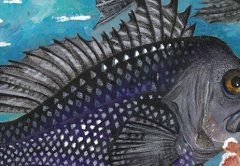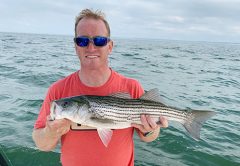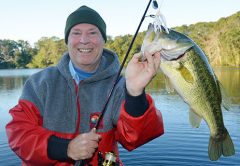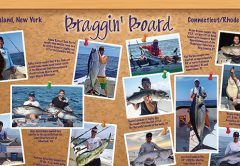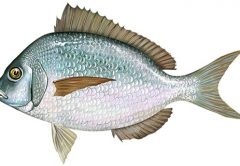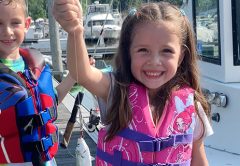I remember staggering into the local all-night diner almost every single Sunday
morning—from as early as 5 a.m. to as late as 9:30 a.m.–for the four or so years I worked night bluefish trips. My fellow deckape, Derek, and I would file right and all the way back to our self-quarantine booth, collapse on our preordained sides of the white-with-dull-gray-squiggles-and-cigarette-burns Formica tabletop, and stare over each other’s left shoulders into the middle distance—a six-foot cloud ceiling of Marlboros swirling around ceiling-fan blades, so thick some nights it nearly blotted out the yellowed ceiling.
After some unofficial decompression period, conscious suddenly that there were no slammer bluefish, (tethered to 8-foot leaders of 250-pound test) coming in overhead like vile-smelling artillery, we’d both reach for menus because that’s what real people do when they go out to breakfast. In reality, the orders never changed and I’m fairly certain neither of us ever read a single word of those laminated sheets. We both knew it was part of the whole ceremony, though— that if we did a convincing enough impression of humans being human then we could go home to our respective dwellings, shower and topple into beds with fairly good odds of waking up actual people.
We sat and chain-smoked and hammered coffees back—we’d agreed this was wise, given that we’d each promised our Fearless Leader we would not, under any circumstances, fall asleep at the wheel and die while driving home. At some point, our waitress, who might have been plain-looking under normal circumstances but who called us each “Hun” or “Sweetie” and told us how hard she knew we must have just worked, who smiled easily and who didn’t keel over dead from the combined stench of two of us, would glide up and nod approval as we stammered and grunted our way through our respective orders—same as last time, every single time. And yet, after 6 hours cutting in silence, so hard to recite breakfast.
The smoother of the two of us, I always made it a point to sweep the 75 or so scales that lifted off my forearms while I sat, drying, brushed them into a napkin and tossed the revolting little bundle into the men’s room trash can. I think Derek had a crush on her. I know I did. I’m equally certain that she had a crush on neither of us. We tipped like ham-fisted big shots, arranged heaps of scaly, blood- smeared bills beneath coffee cups.
I’ve been thinking, as I weed through the latest regulatory news—news items about a cod fishery headed for oblivion north of Cape Cod, whispers of deepening striper trouble at intervals up and down the coast, universal grumbling from my friends clinging to economic viability on the commercial end of the fishery. What’s ahead there’s no way of knowing—except that there will always be, here in the ruins of the industry’s age of innocence, plenty of doom and gloom surrounding men and their boats. Frankly, I’m done with that storyline. After some number of years trying to unravel all the parts of the fishery gone or going or about to go wrong, I’m beginning to understand that the death of fishing is just another plot line spun from our culture’s modern taste for apocalypse.
“If it bleeds, it leads” was a cute dismissal of all things lurid when the news was twice daily. Now, in the 24-hour news cycle, the same rule applies but our psyche is different: We bleed 24 hours a day, 7 days a week.
The Associated Press has begun sniffing around the fish towns in the hunt for despair—a failing fleet, a broken ecosystem, an apocalypse beneath the skin of water, something deep and sick and ominous that no one ashore sees in context—or through a less alarmist ten-year lens. Many are stories that came aboard and washed back out the scuppers a decade ago, when no one cared.
Regardless of their timeliness, such little blips, taken alongside the rest of the sobering news about our fish and oceans, highlight the futility of our last great open-range living.
The oceans look about as small and fragile as my own prospects in the global economy—as fragile as the iPhone screen I use to scroll through our impending doom.
If I resist my memory’s revisionist account of what happened, what that meant, how I felt about it, it never was “ecosystem”—the abstraction—that jingled me up sleepless the night before a three-day canyon run. It was the possibility I might slip a straight gaff through the gillplate of a 325 bigeye inside 30 hours. It was knowing I’d be there, part of this trip with my elective family—the relief that nothing amazing would be happening without me around to see it.
And then, steaming home, it was the first retelling of an awesome story— writing ourselves into a legend in progress. Keeled over our scrub brushes in sleep-deprived hysterics while Donnie filled Derek’s deck boot with water and transferred it to the freezer to set up like concrete.
Watching a hundred striped bass accelerate across the backlit face of the barreling shore break.
Showing the boys the first big-dollar rod a manufacturer shipped me for product testing.
Raising, with three old friends, my fellow deckhands, the first jar of Guinness after 12 straight days offshore.
A sunset so slick calm 125 miles offshore it’s impossible to find the seam between sea and westward sky. The onset of a strong gale—real fear for one’s life a long way from safe harbor. Times you narrowly escaped death. The first time you saw a 300-pound swordie sunning itself topside.
Through 5 or 15 years of trips—terrifying, exhilarating, unspeakably miserable, tedious—fishing tries you, humbles you, proves strength and resolve. Inspires gratitude, respect. Tempers friendships to withstand time and turmoil.
Our waters still have fish and we still have good reasons to fish on.




